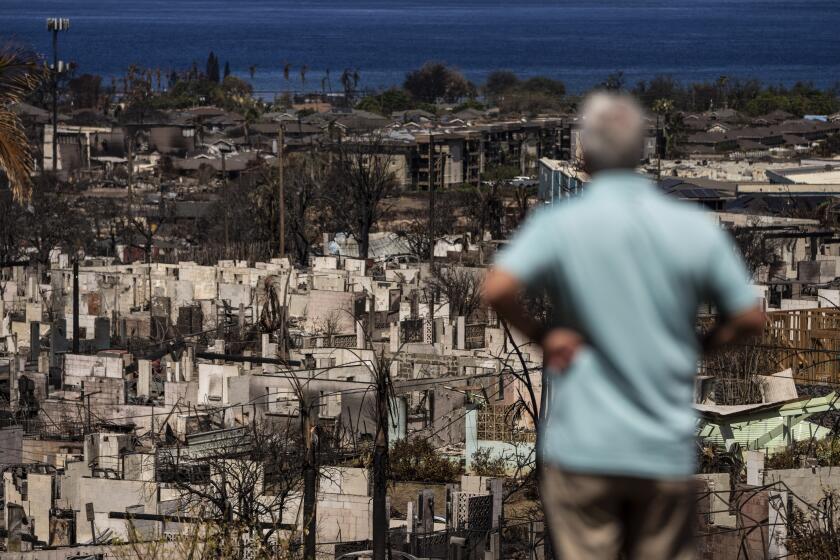Nuclear Agency May Give Iran a Deadline
The board of the U.N.’s nuclear watchdog is expected to approve a resolution today repeating calls for Iran to stop its uranium enrichment program and setting a deadline for compliance.
But the text is far weaker than the U.S. had sought. Convinced that Iran is secretly pursuing a nuclear weapons program, U.S. diplomats have been trying for more than a year to persuade the International Atomic Energy Agency’s board of governors to refer the issue to the United Nations Security Council, which can impose sanctions.
American negotiators came to the meeting of the 35-nation board Monday hoping to present Iran with an ultimatum: Clear up remaining questions about the nuclear program by Oct. 31 or face automatic referral to the Security Council.
But a week of intense negotiations resulted in a diluted resolution without an explicit deadline or penalty. It calls on Iran to “immediately suspend all enrichment activities” and to provide a full accounting of its nuclear program before the board’s next meeting, on Nov. 25, when it will decide “whether or not further steps are appropriate.”
IAEA Director-General Mohamed ElBaradei appealed to Iran to halt its enrichment activities voluntarily.
“At this delicate stage of our investigations it would be in the interest of Iran to do its utmost to create confidence,” he told reporters Friday.
Objections to the resolution from some of the board’s 35 member countries will force a rare vote today, but the resolution is expected to pass. Previous resolutions on Iran were adopted by consensus.
A major point of contention is Iran’s efforts to enrich uranium. The United States and the European Union wanted the text to demand that Iran freeze all enrichment-related activities, but the nonaligned nations desired a statement that all countries have the right to enrich uranium to fulfill energy needs. The compromise resolution includes both.
That ambiguity gives Iran a grace period to voluntarily suspend its enrichment program, but portends a showdown in November if it doesn’t.
Hossein Mousavian, head of Iran’s delegation to the IAEA, said he expected the Iranian government to decide within a few days whether it would comply with the agency’s demand for a total suspension of enrichment.
He said Iran was already honoring an agreement with the EU to freeze enrichment, and though it could restart the program anytime, it probably would extend the suspension until the November deadline. Iran’s present halt to using centrifuges to make weapons-grade uranium doesn’t go as far as the total ban on “all enrichment-related activities” the IAEA resolution seeks.
The division among the board’s members reflects differing beliefs about Iran’s nuclear ambitions and the best way to win Tehran’s cooperation. Since the discovery two years ago that the country had concealed its nuclear program for almost two decades, the U.S. has been pressing the IAEA to find Iran in violation of the Nuclear Nonproliferation Treaty.
Iran has the right to pursue a peaceful nuclear energy program, but its failure to disclose that it had secretly imported and processed nuclear material was a breach of its obligations under the treaty.
European negotiators have disagreed with Washington’s hard-line approach, preferring instead to use trade incentives to win a partial freeze on enrichment activities. They argue that too much pressure could cause Iran to withdraw from the treaty, as North Korea has, leaving the international community with no leverage.
ElBaradei said the agency aimed to present the board with a comprehensive report on Iran’s nuclear activities in November, but he appeared to resist the idea of a deadline.
“Verification is a continuous process,” he said. “The important thing is, are we making progress, are we close to having an assurance that Iran’s nuclear program is exclusively for peaceful purposes.”
ElBaradei said this week that the agency had no proof that Iran was pursuing nuclear weapons capability but that it still couldn’t confirm that Iran’s activities were peaceful.
A last-minute spat broke out at the meeting as allegations surfaced that Iran was conducting nuclear-related activities at its Parchin military site.
Mousavian denied the claims, suggesting that they were part of a U.S. effort to influence the negotiations over the resolution. “Parchin is lie No. 14 from the Americans,” he said.
ElBaradei said the agency was aware of the site but did not have any indication of nuclear-related activities taking place there.
*
Yee reported from Vienna and Farley from the United Nations.
More to Read
Start your day right
Sign up for Essential California for news, features and recommendations from the L.A. Times and beyond in your inbox six days a week.
You may occasionally receive promotional content from the Los Angeles Times.






